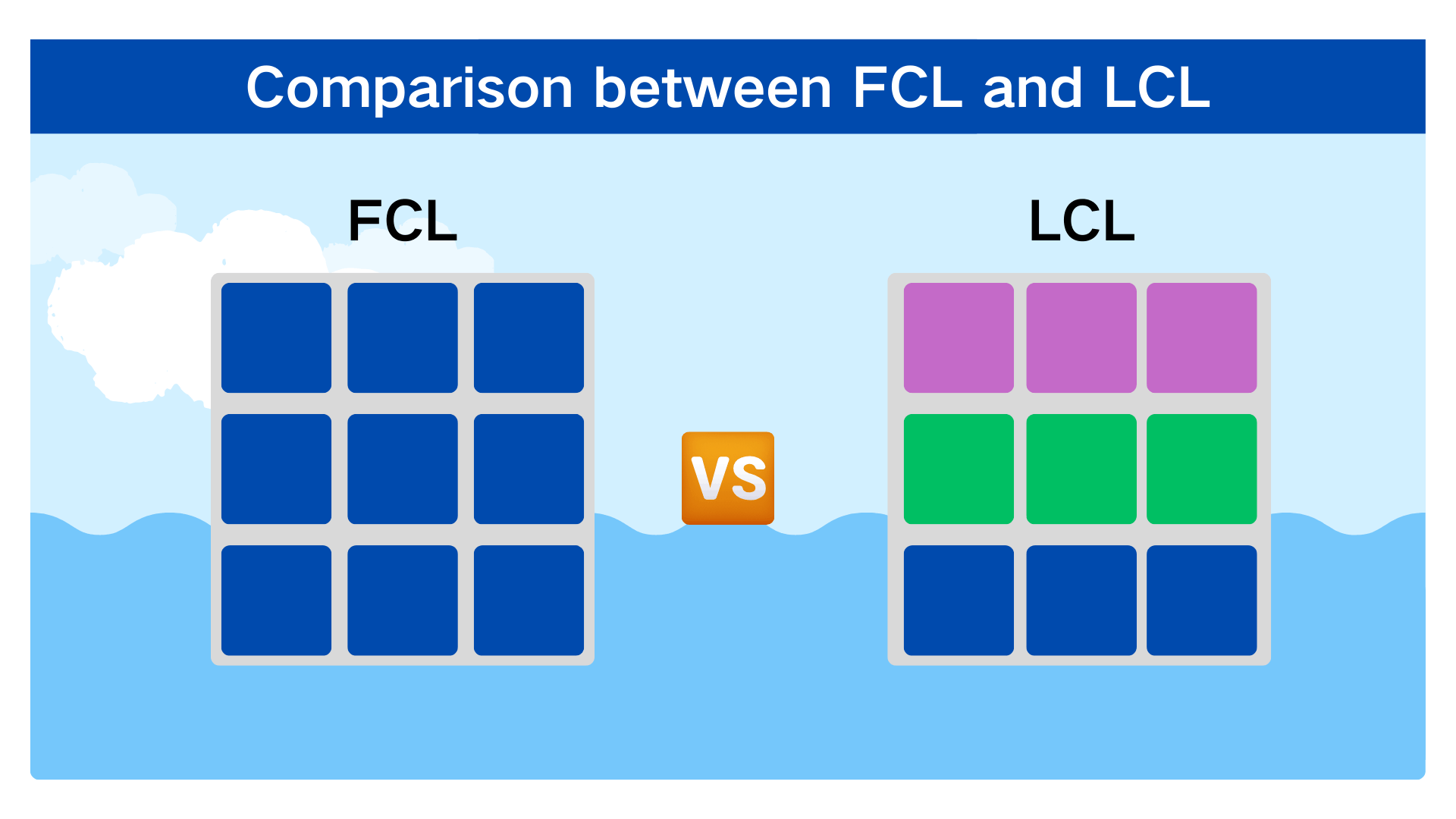When it comes to international shipping, choosing the right mode of transport is crucial for efficiency and cost-effectiveness. Two common options are LCL (Less than Container Load) and FCL (Full Container Load). Understanding the differences between these two shipping methods can help you make an informed decision that best suits your cargo needs. In this blog, we will compare LCL and FCL, highlighting their advantages, disadvantages, and practical considerations to help you determine which is better for your cargo.
What is LCL (Less than Container Load)?
LCL (Less than Container Load) is a shipping method where multiple shippers share the same container. This option is ideal for businesses that do not have enough cargo to fill an entire container. By consolidating shipments from different shippers, LCL allows you to pay only for the space your cargo occupies, making it a cost-effective solution for smaller shipments.
Advantages of LCL:
- Cost-Effective for Small Shipments: Pay only for the space you use.
- Flexibility: Suitable for smaller or irregular shipments.
- Frequent Departures: More frequent sailing schedules.
Disadvantages of LCL:
- Longer Transit Times: Consolidation and deconsolidation can add extra time.
- Higher Risk of Damage: Cargo is handled more frequently, increasing the risk of damage.
- Complex Documentation: More paperwork due to multiple shippers sharing a container.
What is FCL (Full Container Load)?
FCL (Full Container Load) is a shipping method where a single shipper occupies an entire container. This option is ideal for businesses with large shipments that can fill a container or for those who prefer the added security of not sharing space with other shippers. FCL typically offers faster transit times and simplified handling.
Advantages of FCL:
- Faster Transit Times: Direct shipping reduces transit time.
- Lower Risk of Damage: Less handling reduces the risk of damage.
- Simpler Documentation: Fewer parties involved simplifies the paperwork.
Disadvantages of FCL:
- Higher Cost for Small Shipments: Paying for the entire container can be expensive if not fully utilized.
- Less Flexibility: Better suited for larger shipments.

Cost Comparison: LCL vs FCL
Cost is a significant factor when choosing between LCL and FCL.
LCL Costs:
- Pay Per Volume: Costs are based on the volume or weight of your cargo.
- Shared Costs: Expenses such as handling and documentation are shared among shippers.
- Additional Fees: Consolidation and deconsolidation fees may apply.
FCL Costs:
- Flat Rate: Costs are based on the container size, regardless of how full it is.
- Higher Initial Cost: FCL may have a higher upfront cost but can be more cost-effective for larger shipments.
- Lower Per Unit Cost: The cost per unit decreases as the container is filled.
Transit Time: LCL vs FCL
Transit time is another crucial consideration.
LCL Transit Time:
- Longer Transit Times: The consolidation and deconsolidation process can add extra days to the transit time.
- Potential Delays: The need to fill the container with multiple shipments can cause delays.
FCL Transit Time:
- Direct Shipping: FCL shipments often have faster transit times due to direct routes.
- Less Handling: Reduced handling and fewer stops minimize the risk of delays.
Handling and Security: LCL vs FCL
Handling and security are critical for protecting your cargo.
LCL Handling and Security:
- More Handling: LCL shipments are handled more frequently, increasing the risk of damage or loss.
- Shared Space: Sharing space with other shippers' cargo can pose additional risks.
FCL Handling and Security:
- Less Handling: FCL shipments are handled less frequently, reducing the risk of damage.
- Exclusive Use: Exclusive use of the container enhances security and minimizes the risk of contamination or damage.
When to Choose LCL or FCL
Choosing between LCL and FCL depends on several factors.
Choose LCL When:
- Small Shipments: You have smaller shipments that do not require a full container.
- Cost-Sensitive: You want to minimize shipping costs by sharing space with other shippers.
- Flexible Schedules: You can accommodate slightly longer transit times.
Choose FCL When:
- Large Shipments: You have enough cargo to fill an entire container.
- Time-Sensitive: You need faster transit times and more direct shipping routes.
- Higher Security: You prefer the added security of exclusive use of the container.
Get Real-Time Quotes with DdpExpert
Choosing between LCL and FCL shipping can be challenging, but DdpExpert simplifies the process by providing instant and accurate freight quotes for both options. Simply enter your shipment details on the user-friendly platform, and receive competitive quotes from various carriers to make an informed decision for your cargo.
Conclusion
Deciding between LCL and FCL shipping depends on your specific cargo needs, budget, and timeline. LCL (Less than Container Load) is a cost-effective option for smaller shipments and offers flexibility, while FCL (Full Container Load) provides faster transit times, lower risk of damage, and simplified handling for larger shipments. By understanding the advantages and disadvantages of each option, you can make an informed decision that best suits your business requirements. Additionally, leveraging DdpExpert for instant quotes and comprehensive logistics solutions can further aid in making the right choice for your cargo.
 English
English
 Deutsch
Deutsch Português
Português
 العربية
العربية
 中文
中文





